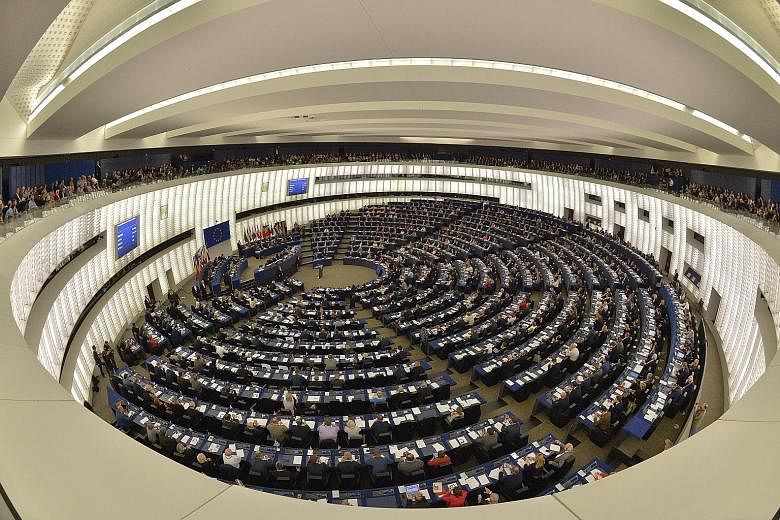Europeans can be forgiven if they look forward to 2016 with a sense of foreboding, rather than anticipation. For many of the problems which beset the continent during 2015 are likely to remain unresolved in the new year.
Chief among these is the state of the European economy. The European Union has managed to avoid a meltdown over Greece, which began last year with a newly elected government determined to tear up all austerity measures imposed by its European partners but ended the year saddled with an even bigger austerity programme.
But the economic costs of keeping Greece in the euro zone are huge. Greece got a further credit line of €86 billion (S$132 billion) in bailout funding for the next three years, on top of an estimated €240 billion already offered since the beginning of the decade. The political costs are considerable too: Greek fury with Germany which dictated the economic agenda in Europe is undiminished. Other European states too resent German influence.
More galling still is that there is no end in sight to Europe's other economic difficulties. For the problem is not merely one of unsustainable sovereign debts, but a broader one of economic prosperity.
Most European nations registered some growth last year. Yet it has been puny - an average growth rate of 0.1 to 0.2 per cent of gross domestic product. Neither Italy nor France, two of the biggest euro zone economies, are even close to addressing their fundamental economic problems.
-
The year ahead
-
• Economic woes continue with key problems of low competitiveness in global markets and rigid labour markets which result in abnormally high youth unemployment unlikely to be solved
• Risks of over-reaction to inflow of asylum-seekers, including imposition of immigration controls that will require decades of efforts to lift
• Terrorist security challenge that Europe is now better equipped to deal with; but broader approach to prevent extremism remains elusive
To make matters worse, the popularity of both the Italian and French governments is sagging, and this year will be the last one free of national elections in both countries; if they do not put their economy in order in the next 12 months, they are unlikely to do so in 2017. Nor can much more help be expected from Germany, Europe's prosperity engine, which may be hit by an economic slowdown in China and Russia, two of its key export markets.
The European Central Bank (ECB) is guaranteed to continue to "do whatever it takes" to defend financial stability, as Mr Mario Draghi, its president, likes to put it. But Mr Draghi's policy of purchasing European government debt in order to prevent another crisis is now coming under sustained pressure from the Germans. And the ECB cannot help with Europe's key economic problems: low competitiveness in global markets and rigid labour markets which result in abnormally high youth unemployment. No bets on Europe tackling these problems in 2016.
The problem of migration has also risen to the top of the political agenda. At least one million asylum-seekers entered the continent last year, with half from war-torn Syria and the rest from various Asian and African nations, as well as from those bits of the Balkans which are outside the EU.
European governments acknowledge that this flow is unsustainable: if nothing is done, a further estimated 1.4 million asylum-seekers are predicted to come this year. The question is whether the EU would be able to control the flows while keeping its existing border-free internal arrangements. The omens are not good. Border controls have been reimposed by many EU member states. Meanwhile, violence against asylum-seekers is on the rise.
-
A new year could mean new beginnings for nations looking for a fresh start. New leaders will be elected in the United States and the Philippines. But there is also a sense that more of the same is the way forward.
But solutions to the problem remain elusive. A German plan to redistribute refugees throughout the EU is a non-starter. Offers to pay Turkey to close its borders, through which most of the migrants from the Middle East arrive, do not seem to produce results either. And the war in Syria is likely to intensify, generating even more refugees.
The danger is that Europe's politicians, for whom the migration question is now a ticking electoral time bomb, will over-react and impose immigration controls that will require decades of efforts to be lifted.
And then, there is the terrorist security challenge. Last year was one of the worst in this respect, with two massive terrorist atrocities in France, and a number of other dangerous terrorist plots foiled in Britain, Germany, Belgium and Spain. The flow of European volunteers to the Islamic State in Iraq and Syria terrorist group also appears to have continued unabated.
Yet Europe is better equipped to deal with the threat now. Although huge gaps in security standards and procedures persist, European nations like Belgium which used to lag behind are now rapidly closing the gap. Legislation is introduced to deal with the interception of communications and police detention powers, two areas in which terrorists exploited European freedoms.
But a broader and more innovative approach to prevent extremism and integrate Europe's Muslim communities remains elusive. So the pool from which the men of violence can recruit their foot soldiers is undiminished. Indeed, as European intelligence services improve their capabilities and coordination, the list of potential suspects who need monitoring has almost doubled. And as intelligence chiefs acknowledge, it's a matter of time before an attack like the one perpetrated in Paris in November takes place in another European city.
"Be prepared, but not alarmed" is the advice European leaders urge on their nations. Still, 2016 is unlikely to boost either Europe's sense of self-esteem, or its current downbeat mood.

